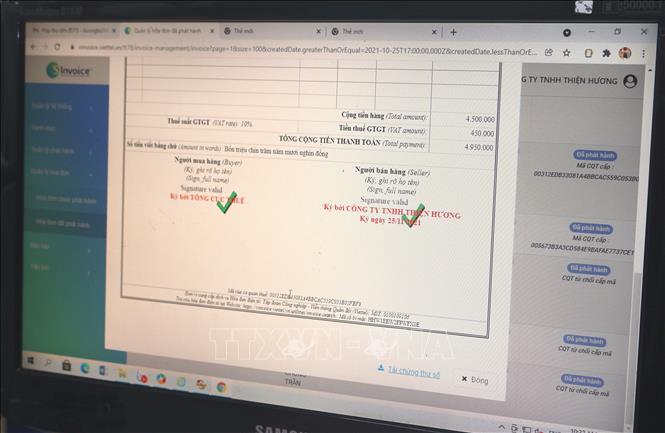
The number of individual businesses registering to use this form of business is not close to reality. The tax sector is making efforts to bring electronic invoices generated from cash registers into life - this is also one of the solutions to increase budget revenue in the context of many economic difficulties.
Electronic invoices have been deployed nationwide, however, they have not been widely used in direct-to-consumer businesses such as restaurants, hotels, supermarkets, retail stores, entertainment venues, etc. Therefore, the tax industry is deploying electronic invoices generated from cash registers to businesses nationwide.
Electronic invoices generated from cash registers are a solution to provide invoices connected to tax authorities, to manage the seller's actual revenue.
Ms. Nguyen Thi Lan Anh, Director of the Department of Tax Management for Small and Medium Enterprises, Business Households and Individuals (General Department of Taxation) said that the implementation of electronic invoices generated from cash registers contributes significantly to public, transparent and equal tax management for subjects participating in production, business and service activities.
The representative of the General Department of Taxation said that there are many benefits when implementing electronic invoices generated from cash registers such as being able to issue electronic invoices immediately to customers even after hours or late at night because invoices printed from cash registers that are connected to transfer data to the tax authority are electronic invoices with the tax authority's code according to regulations.
In addition, customers can be more proactive in correcting errors because electronic invoices generated from cash registers are sent at the end of the day instead of having to send each invoice as with regular coded invoices. In particular, at a point of sale, multiple cash registers can be set up according to regulations to issue electronic invoices to customers quickly and conveniently...
Starting from the end of 2022, as of July 17, 2023, 27,433 businesses and individuals have registered to use electronic invoices with codes from tax authorities generated from cash registers with the number of invoices with codes generated from cash registers being 13.9 million. Of these, by the end of the second quarter of 2023, 54/63 provinces and cities had achieved and exceeded the target of 30%, while 9/63 provinces and cities had not achieved the target.
Speaking to the press, Mr. Le Xuan Truong, Head of the Tax and Customs Department (Academy of Finance) said that when sellers apply electronic invoices generated from cash registers, sales transactions are transparent. Buyers receiving electronic invoices generated from cash registers have a legal basis to bind the seller's responsibility for the origin and quality of goods and services.
Operating in the field of household appliances, Ms. Vu Thi Thu Thuy, Director of a company in Hanoi , said that implementing electronic invoices generated from cash registers helps the company reduce personnel in the accounting department, save time and costs, thereby giving businesses the opportunity to increase revenue and attract consumers through transparency in buying and selling transactions.
As a large locality in the country, Mr. Thai Minh Giao, Deputy Director in charge of the Ho Chi Minh City Tax Department, said that in 2023, the Tax Department plans to deploy 6,674 taxpayers to register to use electronic invoices generated from cash registers; of which, as of July 17, the number of taxpayers who completed registration was more than 3,500 people.
However, according to a representative of the Ho Chi Minh City Tax Department, the implementation is still facing certain difficulties, as there are currently no regulations requiring business activities selling goods and providing services directly to consumers to use electronic invoices generated from cash registers.
In addition, most businesses are still concerned about the cost of upgrading and converting the application software of cash registers at each point of sale to unify the issuance of invoices across the entire system, especially in chain and supermarket models. Meanwhile, electronic invoice applications and software from cash registers have not been deployed in a centralized and unified manner.
Ms. Nguyen Thi Lan Anh also admitted that although she was very determined in directing the implementation, the legal basis did not yet require sellers to issue electronic invoices generated from cash registers to buyers for each transaction.
According to current regulations, businesses can use multiple forms of electronic invoices at the same time; or are allowed to issue total invoices at the end of the day in the fields of retail trade, food service business according to the model of a system of stores selling directly to consumers... therefore, the number of electronic invoices generated from cash registers is not close to reality.
Along with that, the determination in coordination between local agencies and departments in reviewing and handling violations against business establishments that do not issue invoices promptly to buyers when providing goods and services to promote businesses and business households in the field of selling goods and providing services directly to consumers to issue invoices according to the provisions of law has not been really good.
In the coming time, to promote the implementation of electronic invoices generated from cash registers, the General Department of Taxation assigns the heads of the Tax Departments to directly direct the review to increase the number of business establishments to be included in the implementation by the end of 2023 according to the principles.
Specifically, for business households paying taxes under the lump-sum method, the Tax Departments will review and classify lump-sum households operating in the direct-to-consumer sector, especially the food and beverage sector that applies information technology in sales management, to promote and mobilize them to the form of declaration households. From there, businesses will declare and pay taxes according to actual occurrence, creating favorable conditions for issuing invoices at the request of customers when applying electronic invoices generated from cash registers, avoiding being handled for violations of not issuing invoices.
For businesses whose actual business lines are not in the direct-to-consumer sector, different from tax registration, Ms. Nguyen Thi Lan Anh said that it is necessary to review and update information on the tax registration system so that the evaluation criteria for the implementation of electronic invoices generated by the Tax Department's cash register are closer to reality.
In addition, the tax sector will also promote the benefits of electronic invoices generated from cash registers; promote the "Lucky Invoice" program to people and businesses, promote and encourage consumers to get electronic invoices when purchasing goods and services.
Source link








![[Video] More than 100 universities announce tuition fees for the 2025–2026 academic year](https://vphoto.vietnam.vn/thumb/1200x675/vietnam/resource/IMAGE/2025/7/18/7eacdc721552429494cf919b3a65b42e)





















































































![[Infographic] In 2025, 47 products will achieve national OCOP](https://vphoto.vietnam.vn/thumb/402x226/vietnam/resource/IMAGE/2025/7/16/5d672398b0744db3ab920e05db8e5b7d)





Comment (0)